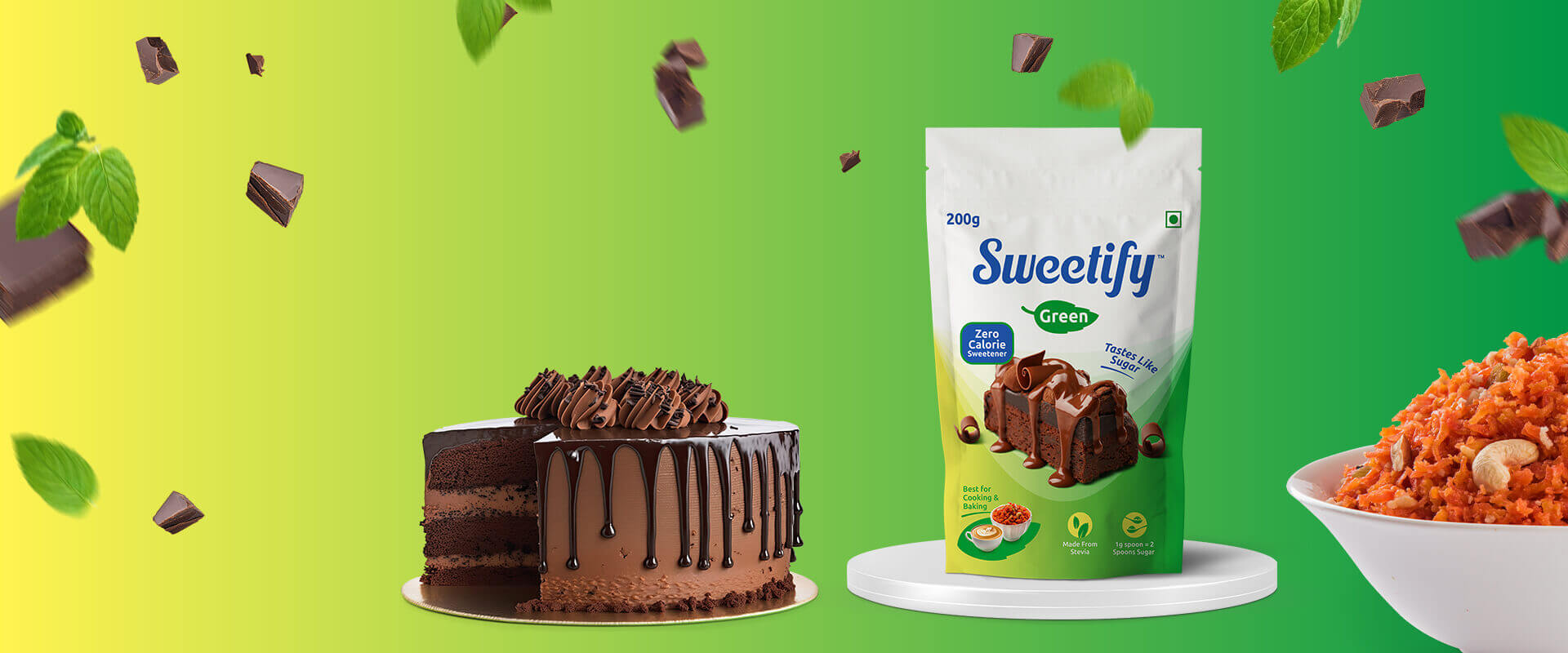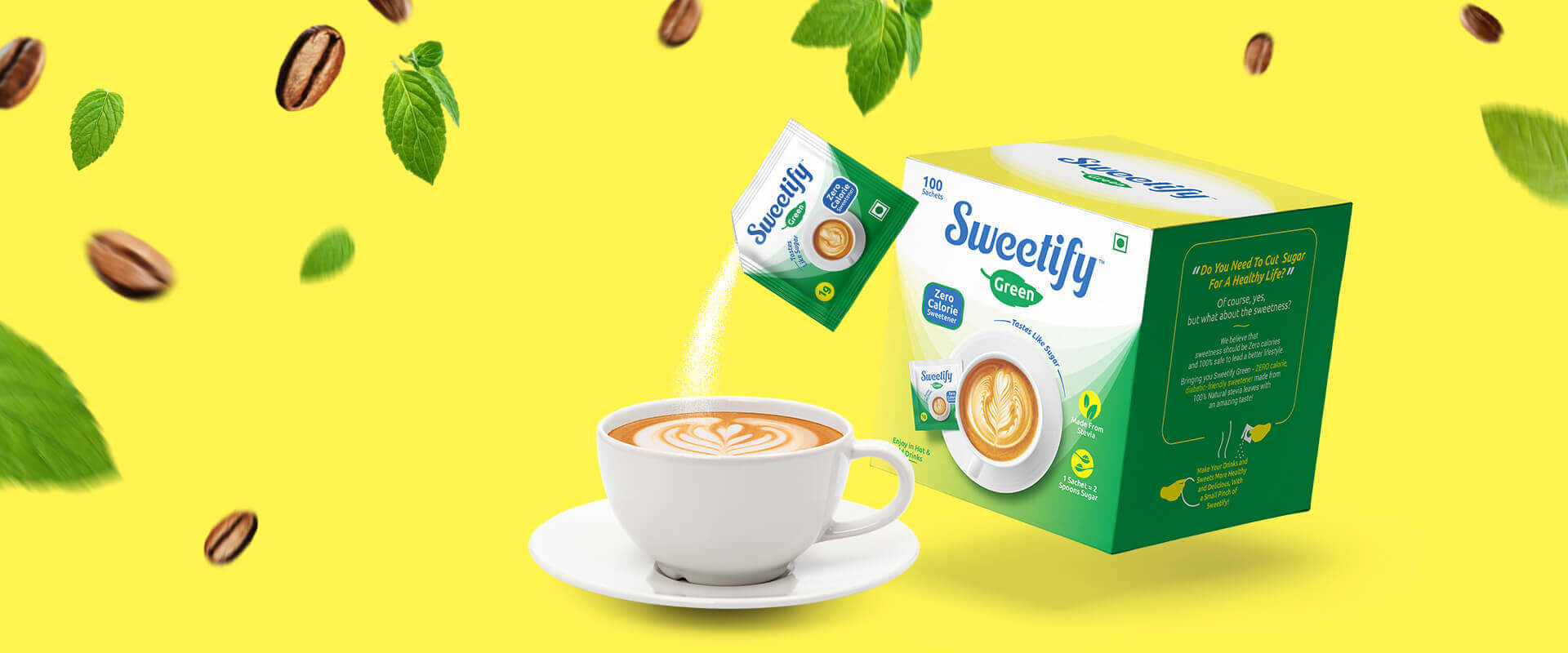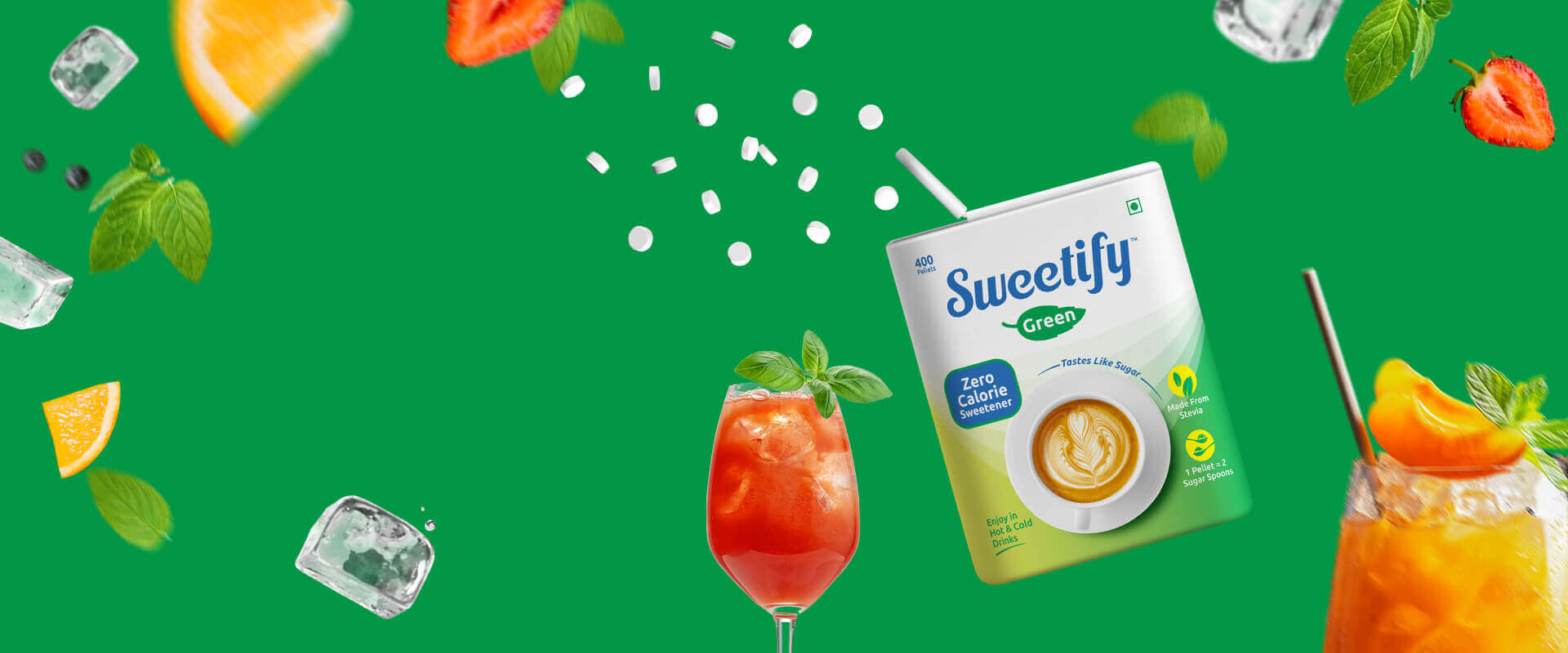Hello sweetie-pies! How are you all? We hope sab Changa Si! If not, then go grab a cup of Kadak chai, and read this interesting article on ‘facts about sugar and sugar substitutes’, because after reading this, you will definitely make some lovely changes to your lifestyle! Come, let’s uncover some not-so-sweet truths.
Facts About Sugar

We ask how sugar got in our food, and this is exactly how it must respond. Yes, that’s how widespread sugar presence is, in Indian diets. The meals we consume, already have a natural sugar presence, on top of it, we consume fruits, a few cups of tea, coffee, homemade or packed juices, and even mini desserts. For Indians, the daily sugar intake limit is 24 to 36 grams, and we potentially end up having at least double every day(natural and added sugar). Not even counting sugar present in processed foods such as chips, namkeen, and biscuits yet.
Sugar is just one type of carbohydrate. When found naturally in food, it is known as sucrose. Can be tasted in fruits, veggies, dairy, and other foods.
Other natural sugars are:
- Fructose
- Galactose
- Glucose
- Lactose
- Maltose
Yeah, so what? Is all kinds of sugar bad?

No, not all sugars are bad, in fact, the natural sugar broken down from our food and diet by our body, is used as energy, and we need it every day. Our body is fueled by sugar, but not all kinds of sugar are nutritional or beneficial for us. The added sugar in processed foods like biscuits, chips, cookies, mini cakes, sodas, and candies is evil, and a higher intake of this doesn’t give us energy, in fact, it may lead to health problems like irregular blood pressure, diabetes, obesity, cavities, and sluggishness.
What are sugar substitutes?
In simple words, sugar ke bhai behen. The sugar substitutes are sweet but don’t contain processed sugar. These can be low-calorie, zero-calorie, or even low-carb.
Let’s categorize these sugar substitutes into 3 parts:
- Natural sugar alternatives
- Chemical/ Artificial sweeteners
- Naturally sourced sweeteners
Natural Sugar Substitutes
Natural sugar alternatives are easily found at home. Yes, we are talking about honey, jaggery, brown sugar, dates, coconut sugar, and some syrups. These don’t contain processed sugar and are often used as a sugar substitute in Indian homes. However, having said that these are healthier than sugar, doesn’t make them 0-calorie or diabetic friendly. These still have calories(less than sugar) and still spike insulin and blood glucose levels.
Here is a little comparison
|
Per 100g |
Calories |
Carbohydrates |
Sugar |
Fats |
Insulin Spike |
|
White Sugar |
387 kcal |
100g |
100g |
0g |
High |
|
Honey |
304 kcal |
82g |
82g |
0g |
Moderate |
|
Brown Sugar |
380 kcal |
98g |
98g |
0g |
High |
|
Dates |
277 kcal |
75g |
63g |
0.2g |
Moderate |
|
Jaggery |
383 kcal |
98g |
98g |
0.1g |
Moderate |
Artificial Sweeteners
Artificial sweeteners are created in the lab, using sugar alcohols, herbs etc source. These are completely nonnutritive, 0 or low-calorie sweeteners, and are often used as a substitute for sugar by diabetic people or weight-conscious people. There has been research that says artificial sweeteners are not completely safe for us and may show risks of cancer, and weight gain. It is always advised to see the entire list of ingredients of such sweeteners before consuming.
Sugar VS Sweeteners
|
Criteria |
Sugar (Sucrose) |
Aspartame |
Saccharin |
Sucralose |
|
Glycemic Index |
65 |
0 |
0 |
0 |
|
Calories |
4 cal/gram |
4 cal/gram |
0 cal |
0 cal |
|
Processed |
Yes |
Yes |
Yes |
Yes |
Here are some common types of artificial sweeteners:
- Acesulfame potassium (Ace-K)
- Advantame
- Aspartame
- Neotame
- Saccharin
- Sucralose
Naturally Sourced Sweeteners
Naturally sourced sweeteners or novel sweeteners are derived from plants, herbs, or fruits naturally. These are completely 0-calorie, have 0 or very low glycemic index, do not spike insulin, and are diabetic friendly!
There has been a great demand and awareness of such sweeteners now, given that most of these are much less processed, gluten-free, and vegan.
Here are some of the most popular ones:
- Stevia
- Allulose
- Monk fruit
- Tagatose
So should we cut off sugar entirely?

Nahi, bilkul nahi. Naturally occurring sugar can be taken in moderation as it gives us energy. Without any sugar in the body, we will start feeling fatigued, have brain fog, and might miss out on important energy, and nutrients.
Our everyday food/meals are good sources of naturally occurring sugars, however, dieticians will always suggest having a limitation on processed/packaged foods or drinks having added sugar. It is highly responsible for weight gain, sluggishness, and slow metabolism.
Conclusion
In another way, you can also try replacing the additional sugar with sugar alternatives like stevia, monk fruit, etc. (being less processed and derived naturally)
FAQs
-
What are the natural sources of sugar?
Some of the commonly known natural sources of sugar are honey, jaggery, brown sugar, molasses, coconut sugar, maple syrup, and many more. - Are artificial sweeteners safe to use?
Most of the artificial sweeteners come with a dietary or consumption limit. One must always look at the label behind the product to understand the ingredients and then decide to consume the sweetener. - Can I completely cut off sugar from my diet?
Cutting off processed sugars completely is very difficult but not impossible. The reason is the widespread presence of processed sugar in packaged or restaurant foods. It is tough to cut off it 100%, but it is surely possible if we try and manage our diet, limit the outside food, and avoid sugar-loaded juices. But, keep in mind, that the naturally present sugar in grains, dairy, and fruits is essential for a balanced diet. -
What is the glycemic index, and why does it matter?
The glycemic index (GI) is like a score that tells us how fast a food can make our blood sugar go up after we eat it. Imagine you have a toy car, and when you push it, it can go either fast or slow. Foods with a high GI are like cars that zoom really fast, making our blood sugar go up quickly. Foods with a low GI are like cars that move slowly, so our blood sugar goes up more slowly.
It matters because if our blood sugar goes up too fast all the time, it can be bad for our bodies. It’s like if your toy car crashes into something because it’s going too fast! So, eating more foods with a low GI helps keep our blood sugar steady and makes us feel better.
- Can sugar substitutes completely replace sugar in recipes?
Nice question! Yes! We can completely replace the ‘additive’ sugar in any recipe, be it your daily chai or a detailed dessert, with the help of sugar substitutes. But you just have to be mindful of the natural/distinct aroma, texture or taste of that substitute, for example: honey.





